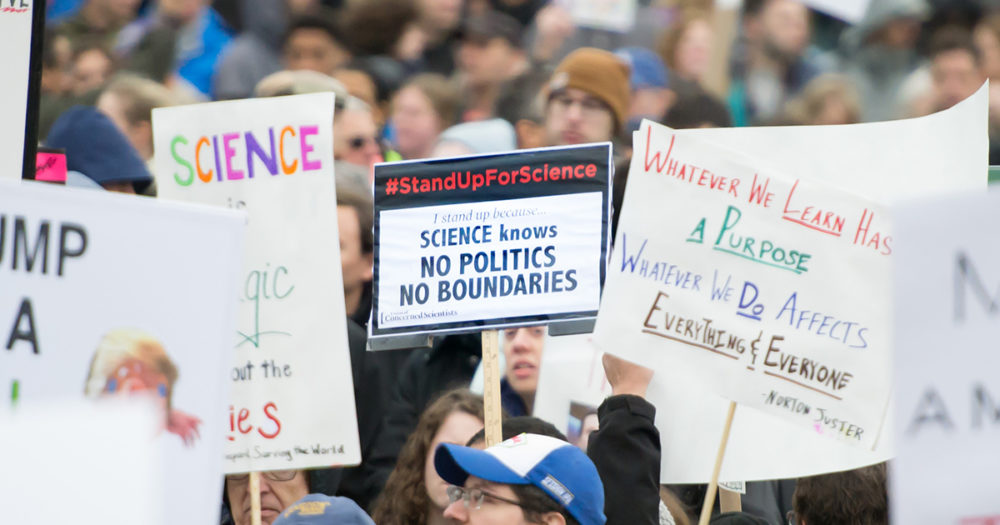Today, UCS is releasing the report “The State of Science in the Trump Era: Damage Done, Lessons Learned, and a Path to Progress.” This report is truly a culmination of the state of science in the Trump era to date. In it, we have detailed the administration’s attacks on federal science and scientists during the past two years, highlighted successes that the scientific community and their supporters have had in pushing back against these attacks, and outlined a path forward for a new Congress to hold this administration accountable for these attacks.
Attacks on science are attacks on our health and safety
In the past two years, we have documented 80 attacks on science by the Trump administration. This large number makes it clear that these are not isolated incidents at this point, but a pattern that signifies that this administration is undermining science in the policy process.
In just two years, the Trump administration has done serious damage to science and science-based policies. They have rolled back science-based protections on air pollution, water pollution, chemical safety, and endangered species. They have excluded scientific staff and studies from the decision-making process. They have placed new restrictions on what science can be used in the creation of policy and put more political pressure on scientific researchers. They have appointed unqualified or conflicted individuals to lead key science agencies—or they have left these positions entirely vacant.
In our research, we also discovered that the Trump administration has conducted far fewer environmental reviews compared with the prior four administrations. During the administration’s first two years only 237 environmental impact statements were prepared. This record low means that there has been far less public input into federal infrastructure projects, and that this administration couldn’t care less about considering alternatives that may be more beneficial to our environment.
The consequences of these actions are real and dangerous. Lives depend on federal science and the enforcement of science-based laws. Through disbanding scientific advisory panels on the particulate matter and ozone pollutants in our air, more people will suffer from asthma attacks, cardiovascular disease, and lung cancer. In asking the Ninth Circuit Court of Appeals—against the advice of scientists—to reconsider its decision for the EPA to ban the dangerous pesticide chlorpyrifos, the administration is exposing children and farmworkers to serious health risks, including brain damage. By amending rules to the Toxic Substances Control Act as suggested by the chemical industry, more people will be exposed to dangerous chemicals like asbestos that cause, among other diseases, cancer.
There is a path forward to reverse this dangerous course
There is a new Congress in town as of January 2019. And with great power comes great responsibility. For the past two years, Congress has neglected its duty to hold the administration accountable to its responsibility of serving the public and making sure that Trump’s political appointees are following the rule and enforcing the law. It’s urgent that Congress put forth proactive solutions as soon as possible to protect the role of science in public policy—to safeguard the public.
We have outlined a path forward for Congress to reverse these attacks on science in our new report. What are our recommendations? I’ll list a few here.
Congress must pass a Scientific Integrity Act to defend federal science from political interference, and craft other proactive legislation to advance the use of science to protect the public. This Scientific Integrity Act should include, among other things, provisions that declare scientists’ right to review and ensure accuracy of public materials that rely on their work or use their name; that prohibit political appointees and communications staff from editing scientific content of official documents; and that declare scientists’ right to publicly express personal views.
Additionally, Congress must address the Trump administration’s sidelining of independent science advice from science advisory committees by bolstering the 1972 Federal Advisory Committee Act (FACA). Congress should, among other recommended provisions, ensure that party affiliations, political opinions, and other inappropriate criteria are not part of the selection process for these committees; clarify that scientists who exercise their rights as private citizens or receive government funding for scientific work should not be excluded from these committees because of concerns of bias; and codify the process used for committee formation.
These are only a couple of the many recommendations we outline to get federal science back on track. There is a lot of work to be done. Did I mention that in two years the Trump administration has attacked federal science and scientists 80 times?
Scientists are pushing back
While Congress has been largely silent on the Trump administration’s attacks on science during the past two years, scientists and their supporters have not. Advocates of federal science have been more engaged and vocal about attacks on science than ever before. They have called out the dangers that these attacks present to the public, demanded that the Trump administration stop these attacks, and urged Congress to take up proactive policy solutions that repair the damage done.
The science community and their supporters have participated in public events, comments, the courts and other avenues to limit the damage and contain some abuses of science in the Trump era. This group has seen great success in pushing back against these attacks on science. Concerted efforts by this group have helped block dangerous nominees to scientific leadership positions—such as Michael Dourson and Kathleen Hartnett White. The release of a suppressed report on contamination of a dangerous group of chemicals known as PFAS was made possible by pressure on Congress from advocates of federal science. And just after Scott Pruitt left his charge at the Environmental Protection Agency, this group of advocates blocked one of Pruitt’s efforts to create a loophole for high-polluting trucks.
When scientists get involved in the democratic process as constituents, they are an unstoppable force.
Keep the fight going
The Trump administration isn’t backing down. It seems that every week, we are helping push back against this administration’s anti-science agenda. But we know our efforts are worth this battle—the health and lives of people across this country depend on federal science. There is path forward with a new Congress to stop this administration’s sidelining of science, but continued and sustained engagement is required. I hope you’ll continue to march on with me—there’s a lot that we all can do.
It’s up to us to let our elected officials know that we care about what’s at stake when it comes to science-based policymaking, so that they step up their efforts to shine a light on bad actors and conduct investigations to hold agencies accountable. The Union of Concerned Scientists has many resources on how to effectively engage with their lawmakers. These resources include guidance on how you can schedule an in-person meeting with your lawmaker, craft a pitch for your lawmaker on a specific issue, and what to say on a call with your lawmaker’s office. To access resources on how to effectively engage with their lawmakers and more, please visit www.ucsusa.org/watchdog.
With a new Congress starting in 2019, we have a renewed opportunity to stand up for science. Join the scientific community in calling on Congress to investigate federal agency actions that undermine critical science-based safeguards. Sign the letter today!

